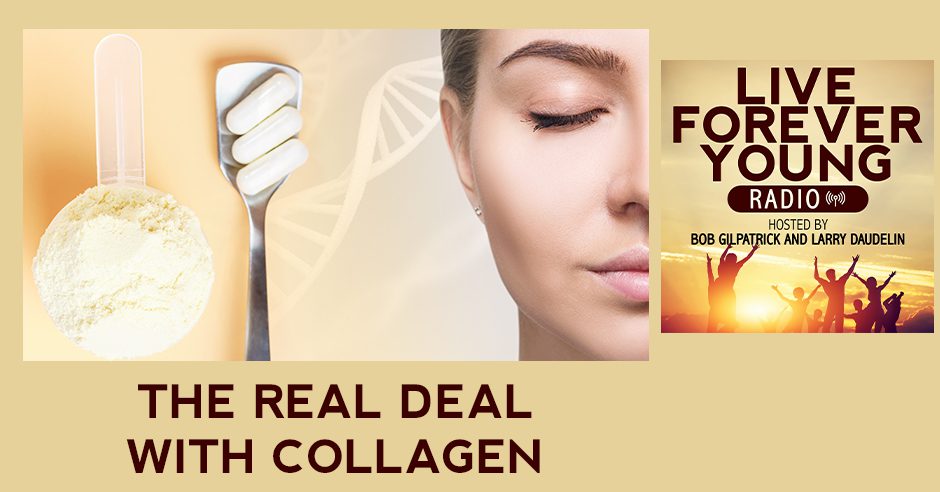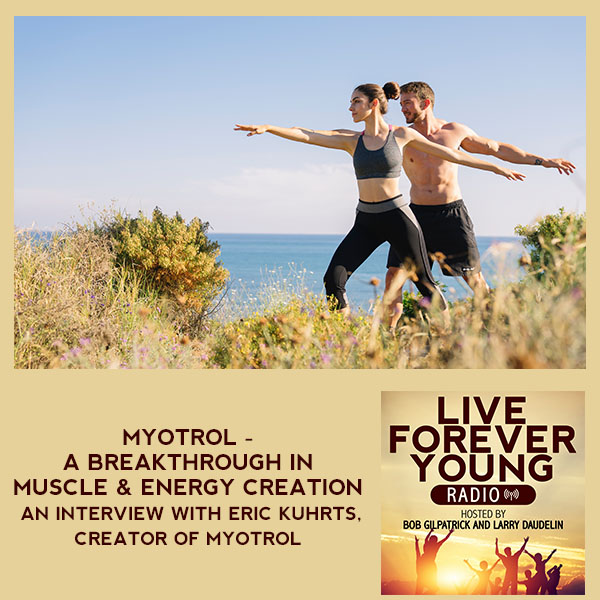
We often hear of collagen in beauty products, helping us maintain healthy skin, hair, and more. But don’t we have it already in us? Why do we have to buy when we can tap into our natural collagen? The answer is that it has become hard these days, and, as we age, we start making less of it. In this episode, Bob Gilpatrick and Rollie Culp talk about the changes in the American diet that have caused natural collagen intake to decrease and what we can do to restore the body’s natural collagen levels. They dive deep into the different types of collagen, why it is important to our health, and why we need to add it to our daily supplement routine. Tune in to learn why collagen is critical and more!
—
Watch the podcast here
Listen to the podcast here
The Real Deal With Collagen
Why Collagen Is Critical
You probably know that collagen helps to maintain healthy skin, hair, nails and joints, but did you know that as you age, you start making a lot less of it? On the show this time, Bob and Rollie talk about changes in the American diet that have caused natural collagen intake to decrease and what you can do to restore the body’s natural collagen levels. They also identify the different types of collagen, the importance of it for your health and what benefits you can expect by adding it to your daily supplement routine. Sit back, relax and get ready to live forever young.
—
Everyone, welcome to the show. I’m Bob and I’m here with Rollie. How are you doing?
How is everything going? I’m excited. I’m glad we’re here and we’re talking. One of the things that is important a lot of people don’t know a lot about or have just started to learn about is how important collagen is for your body. A lot of people realize how important protein is, but the cool thing about collagen is it’s the most abundant protein that your body makes. One of the things that people don’t realize is, as they get older, they start to make less.
Human beings are protein-making machines. We make about 100,000 different kinds of proteins and many millions every second. It’s coded for in our DNA. Collagen is a complex protein. Eighteen different amino acids are used to make up collagen and they’re bound together in a helix. People know about DNA being this double helix. Collagen is a triple helix. There are over 3,000 amino acids just to make up one collagen protein.
The eighteen different aminos make up over 3,000 combinations to create this triple helix structure.
There are about 28 different kinds of collagen. The vast majority, 90% of all the collagen in the human body, is what they call Type 1 and Type 3. These types are different arrangements of amino acids. You’ll notice that usually, when people get collagen, which they’re going to get in powder form most of the time and put it in a glass of water and drink it, it says on the jar that it’s hydrolyzed.
What is hydrolyzed?
Hydrolyzed means that the collagen protein has been broken up into smaller bits called peptides and it’s done by using water. Water is a good substance for dissolving or cleaning things. Water is used to make it smaller. The reason is, those smaller bits are more easily digested, absorbed and way less likely to make you feel bloated from consuming these large molecules.
Collagen is actually the most abundant protein that your body makes. Share on XBy making them smaller, you can absorb them 100 times easier.
It’s important to make sure that you get enough collagen because, after age 30, you start to make a lot less.
One of the things I wanted to bring up at this particular instance, not only do you make less, but back in the day when we used to have farms and slaughter a lot of our meat, there were a lot more things that contained collagen around that you had to use, like bones for bone and beef broth. You’re talking about ligaments and the grizzly pieces of meat. Back in the day, if you were on your own farm, you made broth and used it. A lot more intake of collagen used to be common. As we’ve moved into the industrial society and we throw those pieces of meat out because we don’t want to chew them so much, you lose that intake of collagen as well on top of the fact that when you get older, around 30.
By the time you’re 80, you’re only making 25% as much collagen as you did before. That’s when people start to have noticeable signs of aging. When you start to get wrinkles, that’s because you don’t have as much collagen as you used to.
The collagen helps to keep underneath the skin together and elastic.
It’s plump because collagen helps you to retain moisture as well. It’s important that people pay attention to this and know that you’re going to have to supplement with collagen. As you do, you’re going to begin to get many different benefits from it. The main ones that people hear about are your skin, hair and nails.
Those are the ones that they talk about how to look healthier. When they talk about collagen peptides, they’re talking about the things that happen to your skin and nails where they get softer and smoother. I’ve had a lot of people tell me that when they use collagen, they grow faster.

Collagen: It’s really important to make sure that you get enough collagen because, after age 30, you start to make a lot less.
A lot of people find that their hair grows faster, thicker and fuller as well and that your skin starts to get plumper and retain more moisture. In many cases, people will notice that fine lines and wrinkles start to diminish.
I heard it’s also helpful if you have dry skin. It helps to keep your skin moist and retain water.
Another thing I was interested to see is that people are reporting that they sleep better when they use collagen. It turns out that collagen makes it, so you’re less likely to have temperature fluctuations in your body. A lot of times, when people wake up in the middle of the night because they’re too hot or cold, you have less of that when you take collagen each day. The other thing is fluctuations in blood sugar while you’re sleeping can also affect your temperature. That’s one of the possible reasons that I deduced. They know that when you take collagen, you’ll have less fluctuations in your blood sugar. This was something I learned. It’s like, “It found another benefit.”
Everybody knows about the skin, nails, hair and joints. I know a friend of mine whose mother had bad joints when he was a kid. One of the things even back in the ’80s that they were prescribing for joint health was collagen. Hydrolyzed, specifically, because it’s easier to absorb and utilize. Since you don’t eat a lot of collagen anymore and you produce less, one of the things that you start losing and we’ve read studies about this, is muscle. This collagen is a direct help in not only making but recovering and healing muscle, or if you get sick.
Also, if you get injuries to your tissue, you’re constantly injuring your tissue when you exercise. That’s why you’re recovering from exercise faster. If you’re injured from blunt force or a cut, you tend to recover and heal faster if you’re taking collagen.
One thing I’ve heard people say is, “When you get a little bit older, you get those darker spots on your skin.” I’ve talked to people who take collagen and those little bits of darker spots on the skin start to go away because it’s probably helping to heal that quicker.
Human beings are protein-making machines. Share on XAnother thing I’ve seen is that your blood vessels themselves are healthier and more flexible when you use collagen. That could be part of the reason why wound healing and recovery are faster.
The faster you can get stuff there because you’re helping blood vessels, then the quicker it will heal. It makes sense.
A lot of times, when you have injuries, you need to create new tissue to replace the damaged tissue because sometimes it will die off. Collagen helps with cell division and replication. It provides needed peptides into the cell itself. Glycine is one of the main peptides that are there and is important for your DNA. Once you have that cell division, now you can make new cells to help with the healing, but collagen also helps boost your immunity. If you might get an infection from an injury, it’s less likely if you’re taking collagen and it also reduces inflammation. Inflammation is quite often a hindrance to healing after a time. If your inflammation is lower because of collagen, you can begin to see how all these things stack up to help with these various issues.
Inflammation at the beginning of an injury is there. It’s helpful in the healing process, but when you have a lot of inflammation that builds up and chronic inflammation, it can lead to disease. One of the things that can help reduce that is collagen because of its ability to help with the antioxidant properties. I was talking to a friend about when they were using collagen peptides. They noticed that it helped to give them a little bit more energy. That’s probably another side benefit of collagen.
The other thing is that it helps with the lining in your gut. You have this juncture between the inside of your gut lining and the fluid outside of it. What you don’t want to happen is that you get a gap in between the single-cell wall that’s creating the barrier. Collagen helps with cell division in the gut. You’re constantly building new cells and keeping that tight junction so that you don’t have allergic reactions from bacteria leaking out from your gut. You don’t get non-alcoholic cirrhosis, which is an inflammation of the liver that can happen from a leaky gut line. Believe it or not, collagen can help prevent that.
We did a show called What’s What With Leaky Gut?, where we talked about that. You’ve probably heard of a leaky gut before but aren’t sure what it is, so check that out. Collagen, because of its ability to heal with cell division, probably helps to make that not only something that goes quicker but something that you can rely on. If you’re somebody that has chronic stomach issues where you’ve got a lot of issues or you have an issue with leaky gut, you’re going to need something to help you heal it. When you have an issue like that, it’s an ongoing thing because you have digestive issues and you have a repair to do in your intestinal lining. If you don’t give your body what it needs to repair, you’re going to keep leaking.
You have this connective tissue all throughout your body that is ligaments, tendons and fascia, which is holding everything together. Muscles are connected with ligaments and tendons. Your internal organs are held in place by this fascia, which they call the endless web. Collagen helps with the integrity of that fascia as well. Some people will say, “How much of this do I take?” It’s a protein source. You have to first know that you don’t want to have more than 20 grams of protein in a two-hour period. The amount of collagen you need on a given day is approximately between 10 and 20 grams.

Collagen: Your blood vessels themselves are healthier and more flexible when you use collagen.
I was reading that it depends a lot on the weight of the person.
Our collagen is right in the middle at 15 grams. It comes with a scoop that will give you 15 grams. There are 30 scoops at 15 grams in there.
I noticed that a lot of other collagens I’ve been looking at don’t give you quite that much in a scoop. It’s usually around 10 or 12.
If you’re a smaller person, you can take a little less. If you’re a big person, you can always take a little more. The main thing is don’t take it with your other protein sources. If you have Gladiator Barley and Boomer Boost or you’re having a meal with a lot of protein, keep your collagen separate from that by a two-hour period. Otherwise, all that protein will compete for absorption and it will be a waste.
My wife, who uses the Barley, started using the collagen, she will do the collagen in the morning with her coffee and maybe around lunchtime do the Barley. She will do the Boost in the morning too, because of the energy.
Some people will put collagen in their coffee. I do that. You can mix it in water. You can do it in many different ways. You can put it in a smoothie, but you want to follow that rule of 20 grams of protein every two hours.
If you don’t use it, it gets wasted and it could even pile up as extra weight. We don’t want that. We covered quite a bit of stuff.
That’s pretty much it. Thank you everyone for reading. We’ll see you in the next episode.
Important Links:
- What’s What With Leaky Gut? – Previous episode
- Gladiator Barley
- Boomer Boost






